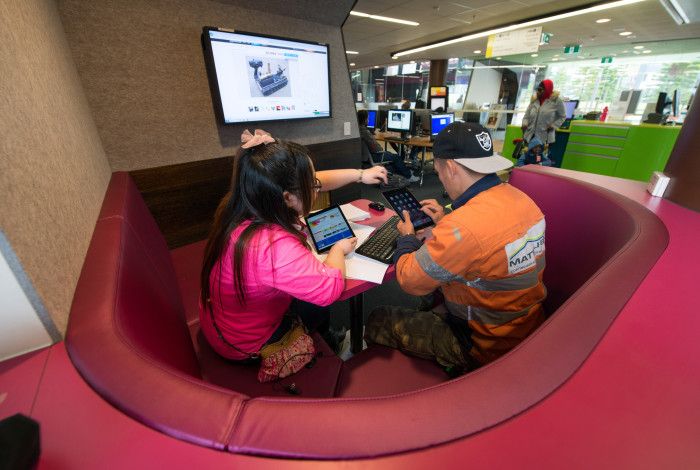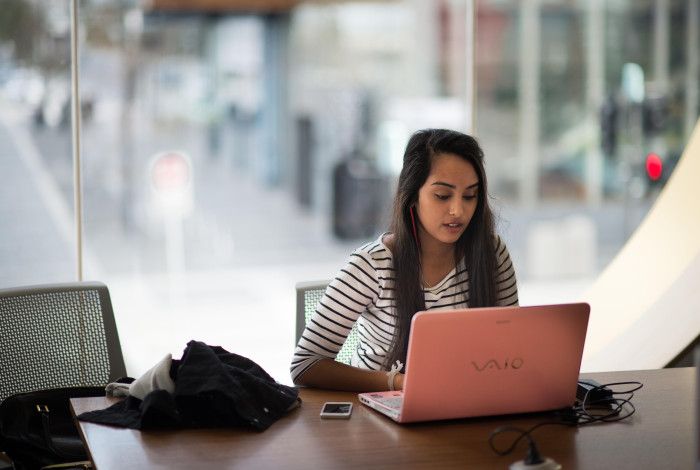The library works with anti-bullying and internet safety organisations to develop digital skills and provides access to easy-to-use cyber safety resources.
Staying safe online at home, school and the workplace is also known as internet safety, e-safety and cyber safety.
The library is an eSmart accredited service. Find resources below for when things go wrong and learn where to go for help.
Australian Internet Safety Organisations
Australian internet-safety organisations, with easy-to-use resources for families and children.
Access more information about eSmart Libraries
Alannah Madeline Foundation (AMF)
The AMF Foundation is an advocate for children's safety and wellbeing in the community, at schools and in libraries.
Find more about the Alannah Madeline Foundation
eSafety Commissioner
The eSafety Commissioner supports all Australians to have a safer experience online, understand online safety risks and where to go for help.
Access the eSafety Commissioner - safety online
The Carly Ryan Foundation
The Carly Ryan Foundation is a non-profit charity and a certified online safety program provider for families and students.
Stay Safe Online - Carer and Parent Help
Domestic violence | eSafety Commissioner
Domestic, family and sexual violence can be physical or non-physical abuse and include things that happen online or that use digital technology. Technology-facilitated abuse – or tech abuse – can be difficult to recognise as people often do not realise it is a form of abuse and is unlawful.
Learn more about online and tech-based abuse
eSafety Parents
Take a tour of the safety resources targeted to the specific needs of parents and carers. Provided by the eSafety Commissioner.
View eSafety parents and carer resources
How to help someone deal with tech-based abuse | eSafety Commissioner
Tech-based abuse can include things that happen online or that use digital technology, including harassment, making threats, stalking and patterns of controlling behaviour.
How to deal with tech-based abuse
Parent Hub - Dolly's Dream
Build a trusting and supportive relationship with your child as the key to helping them stay safe online.
Find support and resources at the Parent Hub - Dolly's Dream
ThinkUknow
ThinkUknow what young people see, say or do online? Get help, support and report abuse. Resources for parents, students and educators
Access ThinkUKnow program for parents and educators
5 tips for a safer, more positive internet
We rely on the internet for almost everything in our lives, so online safety is more important than ever.
As the risk of online abuse and new threats increases, it's important to educate ourselves and others at work, at home, at school and in the community on how to be safer online.
Whether you’re an educator, professional, parent or student, everyone can follow our top 5 tips to help make the internet a safer, more positive place for all.
Watch the short video - 5 tips for a safer, more positive internet.
Report Cyber Crime
Report inappropriate behaviour online. Examples of cybercrime include stealing identities or intellectual property, committing fraud, or violating privacy laws. Contact the police immediately on 000 when things go wrong or access any of these organisations to report a cybercrime.
ReportCyber
ReportCyber is the Australian Government’s online cybercrime reporting tool for Australian individuals, businesses and government.
Report a cyber crime using ReportCyber tool
IDCARE
IDCARE Australia and New Zealand provides free phone consultations and advice for people experiencing identity theft.
See how to report stolen identity online at IDCARE
Scamwatch Australia
Find out more about scams and how to be safe online at Australian Competition and Consumer Commission (ACCC)
Help with Technology, Devices and Online Resources
Stay safe online and make informed choices when using websites, games, apps and social media.
Read more about how to get help with technology, devices and online resources at the library
ABC Education - media literacy
Learn some handy first steps to fact check news and information online. Check interactive lesson on spotting online misinformation and disinformation. Content developed by RMIT ABC Fact Check and ABC Education.
Access media literacy lessons at ABC education
Be Connected
Free online presentations for beginner to intermediate digital users. Learn how to stay safe online and use technology with confidence. Provided by the eSafety Commissioner.
Access the free information and webinars at Be Connected
Learn cyber security
Simple steps to protect individuals, families and small business owners. Provided by the Australian Cyber Security Centre (ACSC).
Find simple tips and practical ways to be safe online at Cyber.gov.au
Media Literacy Lab
Teaching and learning tools to equip young people with essential media literacy skills to make better choices when using online services. Provided by the Alannah and Madeline Foundation, with support from Google.
Access the free training at the Media Literacy Lab
Online Safety Series
Educational information about how to keep you, your information, and your money safe online. Created by Crime Stoppers Victoria and BankVic.
Find out how to keep yourself safe from online criminal activity at Crime Stoppers Victoria
Women and Gender-based Online Safety Support
1800RESPECT
24-hour support available to people impacted by sexual assault, domestic or family violence and abuse. Call 1800 737 732, chat online via the website or text 0458 737 732.
Online safety checklist
This checklist sets out the essential safety steps for anyone experiencing tech-based domestic, family or sexual violence. Developed by the eSafety Commissioner.
View the Online Safety Checklist
eSafety Women
Australian women can take control of their online experiences, and access support and resources. Developed by the eSafety Commissioner.
Access resources for eSafety women
The Orange Door
The Orange Door is a free service for adults, children and young people who have experienced family violence. Also provides assistance to families who need extra support with the care of children.
Contact the Orange Door service near you
Women's technology safety and privacy toolkit
Online privacy and safety tips for women in the workplace and at home. Includes smartphone privacy and location safety information, tips and support resources. The Toolkit is a Safety Net Australia Project of WESNET.
Youth - Ages 12-25 Stay Safe Online
Youth Services - ages 12-25
Find ways to stay safe online if you are aged between 12-25. Find help to answer your questions in tough times and beyond in Greater Dandenong.
View services that support ages 12-25 in Greater Dandenong
It's Time We Talked
A violence prevention program to find support and have the conversation about the influence of pornography. Formerly known as Reality & Risk.
eSafety Young People
Learn how to deal with common issues affecting young people online. Topics include bullying, nude photos, online dating, gaming, online hate, catfishing and more. Provided by the eSafety Commissioner.






